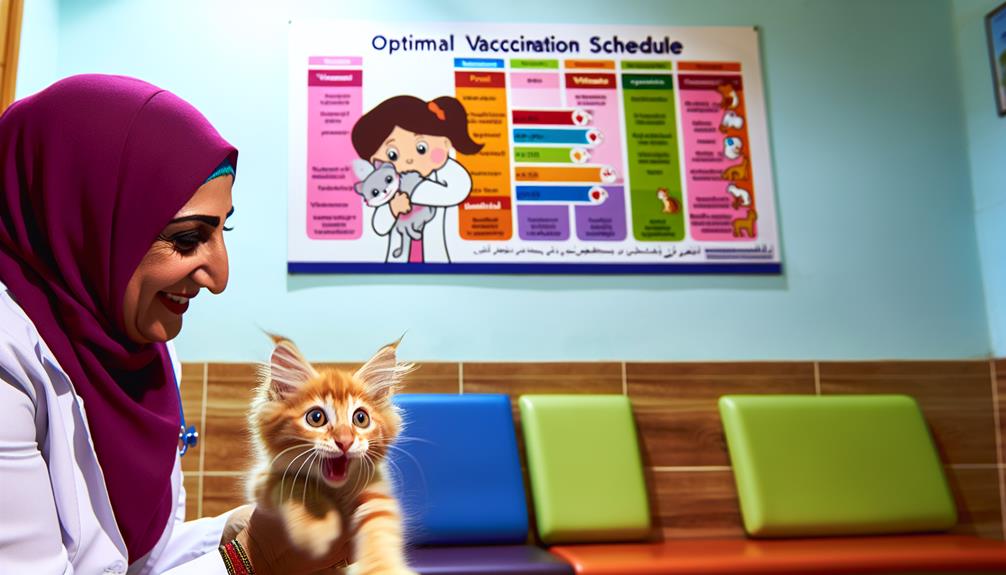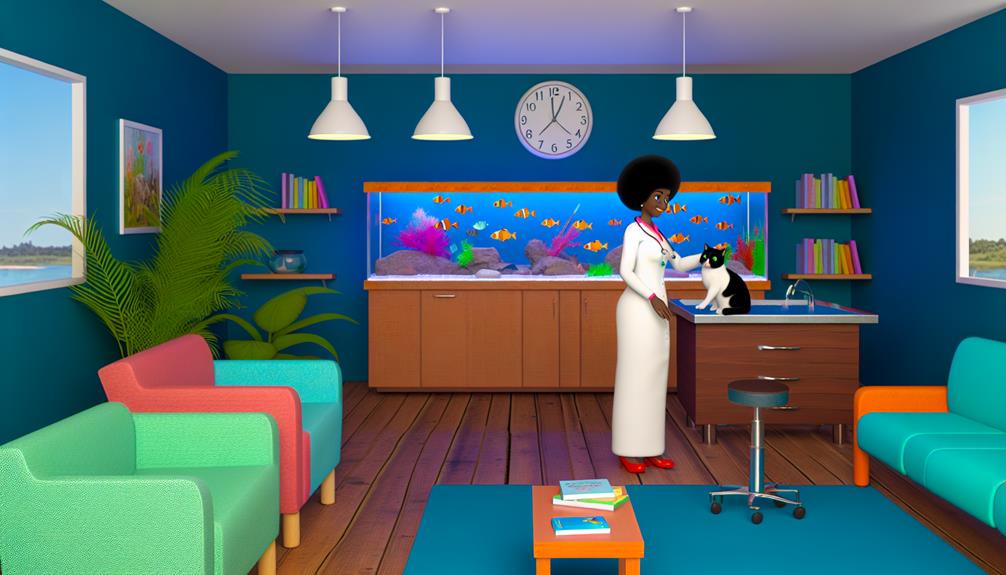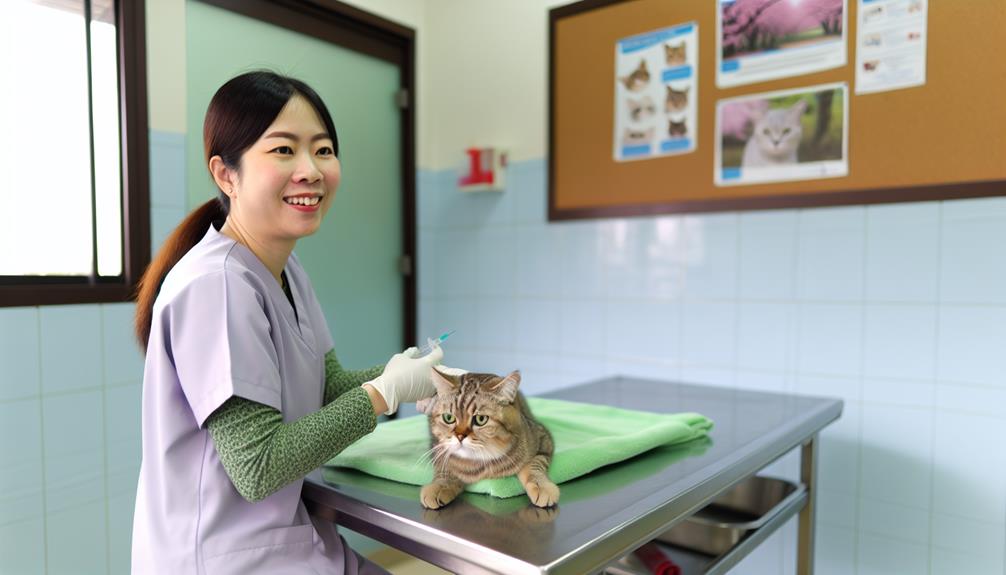Hey there, cat lovers! Today, we're going to talk about something super important: vaccinations for kittens. Just like human babies, kittens need vaccines to stay healthy and protected from diseases. But with so many vaccination schedules out there, it can be overwhelming to figure out the best one for your furry friend. Don't worry, though, because we've got you covered! In this article, we'll break down the top 5 best vaccination schedules for kittens. By following these schedules, you can give your kitten the best chance at a long and happy life. So let's get started and learn all about keeping our feline friends safe and healthy!
Key Takeaways
Key Takeaways:
- Following a proper vaccination schedule is crucial for your kitten's health as it protects them from diseases and reduces the risk of serious complications.
- Consult with your vet to determine the best vaccination schedule for your kitten.
- Timely vaccinations keep your furry friend safe and healthy.
- Vaccinations are an important part of preventive healthcare for kittens.
- By getting your kitten vaccinated, you are taking an active role in ensuring their well-being and happiness.
Initial Vaccinations
Let's Talk about Vaccinations for Your New Kitten!
Did you know that vaccinations are super important for keeping your kitten healthy? They protect them from dangerous diseases and help their immune system grow strong. But what exactly do kittens need to stay safe and healthy?
Here are the key things you need to know about vaccinations for your new kitten:
- What diseases do vaccines protect against?
- Feline panleukopenia (FPV)
- Feline viral rhinotracheitis (FVR)
- Feline calicivirus (FCV)
- Rabies
- When should vaccinations start?
- Usually around 6 to 8 weeks of age
- What is the first vaccine called?
- FVRCP (Feline Viral Rhinotracheitis, Calicivirus, Panleukopenia)
- How often should the vaccine be given?
- Every 3-4 weeks until the kitten is 16 weeks old
- Is there a vaccine for rabies?
- Yes, it is typically given around 12 weeks of age
- How are vaccines given?
- Through a subcutaneous injection, which is just beneath the skin
- Who should administer the vaccines?
- A licensed veterinarian who can determine the right schedule and monitor your kitten's health
Core Vaccinations
Are you taking the right steps to protect your kitten's health? One important way to do that is through core vaccinations. These vaccinations are like superheroes, fighting against common and dangerous feline diseases. Let's learn more about why they're so important and how they work!
What are core vaccinations?
- They're vaccines that all cats should get, no matter where they live or what they do.
- Core vaccinations protect against diseases like feline panleukopenia, feline herpesvirus, and feline calicivirus.
Are they effective?
- Absolutely! Core vaccines have been tested and proven to be highly effective in preventing these diseases.
- Vaccine efficacy means how well a vaccine protects against a specific disease.
How do they work?
- Core vaccinations help your kitten's immune system build a strong defense against the diseases they target.
- They're given in a series of shots at specific times to make sure your kitten gets the best protection.
Why is following the vaccination schedule important?
- It's crucial to stick to the recommended schedule to ensure your kitten gets the right protection at the right time.
- By following the schedule, you're helping your kitten stay healthy and happy.
Booster Shots
Why are booster shots important for your kitten's health?
Boosters shots are like a superpower for your kitten's immune system. They help to make sure your furry friend stays protected against common kitty diseases. Here's what you need to know:
- Vaccination power-up: Booster shots are like a refresher course for your kitten's immune system. They help strengthen the immune response and make sure the initial vaccines keep working their magic.
- Timing is everything: Booster shots are given at specific times to make sure your kitten stays protected. Your vet will give you a schedule of when each shot should be given. It's important to follow this schedule to keep the vaccines working their best.
- Mild side effects: Just like with any medicine, there can be some side effects from booster shots. But don't worry, they're usually mild and temporary. Your kitten might have a little fever, feel sleepy, or have a bit of swelling where the shot was given. Serious reactions are very rare, but if you notice anything unusual, talk to your vet.
- Personalized protection: Your vet will consider your kitten's health, lifestyle, and the diseases they might be exposed to when deciding on the right booster shot schedule. They'll make sure your kitten gets the best protection possible.
Optional Vaccinations
Optional Vaccinations: Protecting Your Kitten's Health
Did you know that there are additional vaccinations that can help keep your kitten healthy and protected? Let's explore two important optional vaccinations that you should consider for your furry friend – feline leukemia (FeLV) and rabies.
Feline leukemia is a viral disease that can be spread through close contact with infected cats. If your kitten spends time outdoors or interacts with other cats, especially those whose health status is unknown, they may be at a higher risk of contracting feline leukemia. But don't worry, getting your kitten vaccinated against this disease can prevent serious health issues and even save their life.
Rabies is a deadly viral disease that can affect all mammals, including cats. It is usually transmitted through the bite of an infected animal. By vaccinating your kitten against rabies, you not only protect their health but also contribute to public health. In fact, many areas require rabies vaccinations by law to ensure the safety of both animals and humans.
To determine if your kitten needs these optional vaccinations, it's important to have a conversation with your veterinarian. They will consider your kitten's lifestyle, potential exposure, and local regulations to provide expert advice on the best vaccination schedule.
So, let's recap:
- Feline Leukemia (FeLV) vaccination is recommended for kittens that spend time outdoors or interact with other cats.
- Rabies vaccination is crucial for your kitten's protection and is often required by law.
- Consult with your veterinarian to determine the need for these vaccinations based on your kitten's specific circumstances.
Importance of Timely Vaccinations
Why Do Kittens Need Vaccinations?
Did you know that just like humans, kittens need vaccinations to stay healthy? It's true! Vaccinations are like a shield that protects your kitten from getting sick. But why are they so important? Let's find out!
- Superheroes for your kitten's immune system: Vaccines are like superheroes that train your kitten's immune system to fight off bad germs. They teach the immune system what the bad guys look like so it can defeat them and keep your kitten healthy.
- Serious illness prevention: Vaccinations protect your kitten from really serious diseases that can make them very sick or even cause death. These diseases have scary names like feline panleukopenia, feline herpesvirus, and feline calicivirus. Yikes! But don't worry, vaccines can keep your kitten safe from these bad guys.
- Helping the kitty community: When your kitten gets vaccinated, they become part of a team that helps keep all the kittens in the neighborhood healthy. This is called herd immunity. By getting vaccinated, your kitten is protecting not only themselves but also other kittens who can't get vaccinated.
- Side effects are no biggie: Sometimes, after getting a vaccination, your kitten might feel a little sore or tired. They might even have a slight fever. But don't worry, these side effects are usually temporary and go away on their own. It's just your kitten's immune system getting stronger!
Frequently Asked Questions
Can Kittens Receive Vaccinations if They Have a Compromised Immune System?
Frequently Asked Questions:
Q: Can kittens with weak immune systems get vaccinated?
A: Some kittens with compromised immune systems may not be able to handle the potential risks of vaccinations. It's important to talk to a veterinarian and closely monitor their health during vaccination.
Q: Why might kittens have weakened immune systems?
A: Kittens can have weakened immune systems due to genetic factors, certain illnesses, or stress. This can make it harder for their bodies to fight off infections and illnesses.
Q: How can we protect immunocompromised kittens?
A: To protect immunocompromised kittens, it's important to keep them in a clean and stress-free environment. Regular check-ups with a veterinarian and proper nutrition can also help support their immune systems.
Q: What are the risks of vaccinating immunocompromised kittens?
A: Vaccinations help protect against diseases, but for kittens with weakened immune systems, there is a small risk of their bodies not responding well to the vaccine. This is why close monitoring and consultation with a veterinarian is important.
Q: Are there any alternatives to vaccinations for immunocompromised kittens?
A: In some cases, a veterinarian may recommend alternative ways to protect immunocompromised kittens, such as using antiviral medications or isolating them from potential sources of infection. It's important to follow the veterinarian's guidance.
Q: Can immunocompromised kittens ever get vaccinated?
A: In some cases, if the kitten's immune system is stable enough, vaccinations may be possible. However, this decision should be made by a veterinarian who can assess the risks and benefits based on the individual kitten's health.
Q: What should I do if I think my kitten has a weakened immune system?
A: If you suspect your kitten has a weakened immune system, it's important to consult with a veterinarian. They can perform tests and provide guidance on how to best manage your kitten's health and protect them from potential infections.
Q: Can immunocompromised kittens still live a healthy life?
A: With proper care and management, immunocompromised kittens can still lead healthy lives. It may require extra attention to their health, regular check-ups, and following a veterinarian's advice on vaccinations and overall care.
Q: How can I support the immune system of an immunocompromised kitten?
A: Providing a balanced and nutritious diet, minimizing stress, and keeping their environment clean can help support the immune system of an immunocompromised kitten. Regular veterinary care is also important to monitor their health and make any necessary adjustments to their care plan.
Are There Any Potential Side Effects or Risks Associated With Vaccinations for Kittens?
Frequently Asked Questions about Vaccinations for Kittens
Q: Are there any side effects or risks with kitten vaccinations?
A: Yes, there can be some side effects, like allergic reactions or reactions at the injection site. However, these are usually rare and the benefits of vaccination outweigh the risks.
Q: What are allergic reactions?
A: Allergic reactions happen when a kitten's immune system reacts strongly to something in the vaccine. This can cause symptoms like swelling, itching, or difficulty breathing. It's important to watch for any signs of an allergic reaction after a vaccination.
Q: What are injection site reactions?
A: Injection site reactions are when a kitten's skin gets a little sore or swollen where the vaccine was given. It's like a little bump or redness. It usually goes away on its own and is not serious.
Q: What are rare adverse events?
A: Rare adverse events are very uncommon and happen when something unexpected and serious occurs after a vaccination. They can include things like a severe allergic reaction or other serious health problems. But remember, these events are extremely rare.
Q: Should I be worried about these side effects and risks?
A: It's always good to be aware of potential side effects and risks, but please don't worry too much. Vaccinations are important to keep kittens healthy and prevent diseases. The chances of having a serious problem from a vaccine are very low.
Q: What should I do if my kitten has a reaction or side effect?
A: If you notice any unusual symptoms after your kitten's vaccination, like excessive swelling, difficulty breathing, or any other concerns, it's important to contact your veterinarian right away. They can give you guidance and help your kitten feel better.
Q: Can I prevent side effects or risks?
A: While you can't completely prevent side effects or risks, there are things you can do to minimize them. Make sure your kitten is healthy before getting vaccinated, follow your vet's instructions for vaccination schedule, and keep an eye on your kitten after the vaccination. Your vet will also be there to help if anything comes up.
Can Kittens Be Vaccinated While They Are Still Nursing From Their Mother?
FAQs: Vaccinating Kittens While Nursing
Q: Can kittens be vaccinated while they are still nursing from their mother?
A: Yes, kittens can start getting vaccinated when they are around 6 to 8 weeks old, even if they are still nursing from their mother. Vaccinations help protect kittens from dangerous diseases, and it's important to start them early. The vaccines will help their immune system become strong and ready to fight off diseases.
Q: Why is it important to vaccinate kittens?
A: Vaccinating kittens is important because it helps protect them from diseases that can make them very sick or even cause death. Kittens have weaker immune systems, so vaccines give them extra protection. It's like giving them a superhero shield against harmful germs!
Q: What diseases do the vaccines protect against?
A: The vaccines protect against diseases like feline distemper, feline leukemia, and respiratory infections. These diseases can be very serious for kittens, and the vaccines help prevent them. It's like giving your kitten a suit of armor to keep them safe and healthy!
Q: How do vaccines work?
A: Vaccines work by teaching the kitten's immune system how to fight off specific diseases. They contain tiny bits of the germs that cause the diseases, but in a safe and weakened form. When the kitten gets the vaccine, their immune system learns how to recognize and attack those germs. So, if the kitten ever comes in contact with the real disease, their immune system is ready to fight it off!
Q: Do kittens need multiple vaccinations?
A: Yes, kittens need a series of vaccinations to make sure they are fully protected. These vaccines are usually given in a series of shots, spaced a few weeks apart. Each vaccine builds on the previous one, giving the kitten stronger and longer-lasting protection. It's like adding layers to their superhero shield!
Q: Can kittens get vaccines if they are sick?
A: It's best to wait until kittens are feeling better before giving them vaccines. If they are sick, their immune system might not respond as well to the vaccines. It's important for kittens to be healthy and strong when they get their vaccines so they can get the most protection possible.
Do Indoor Kittens Need Vaccinations as Much as Outdoor Kittens?
Frequently Asked Questions:
Q: Do indoor kittens need vaccines?
A: Yes, even though indoor kittens have less exposure to diseases than outdoor kittens, vaccines are still important. Indoor kittens can still be exposed to germs brought in by people or other pets. Vaccines help protect their overall health and keep them safe.
Q: Why are vaccines important for indoor kittens?
A: Vaccines are crucial because they prevent kittens from getting sick. They work by teaching the kitten's immune system how to fight off dangerous diseases. This keeps them healthy and helps them live a long and happy life.
Q: Can indoor kittens get sick from other pets or people?
A: Yes, indoor kittens can still get sick from germs brought in by other pets or people. Even if they don't go outside, they can still be exposed to diseases. That's why it's important to keep their vaccines up to date and take them to the vet regularly.
Q: What happens if an indoor kitten doesn't get vaccinated?
A: If an indoor kitten doesn't get vaccinated, they are at risk of getting sick from diseases that could have been prevented. This can make them very sick and even cause long-term health problems. Vaccines are like a shield that protects kittens from harmful germs.
Q: Can vaccines help indoor kittens live longer?
A: Yes, vaccines can help indoor kittens live longer. By protecting them from dangerous diseases, vaccines keep them healthy and reduce the chances of them getting seriously ill. When kittens stay healthy, they can enjoy a longer and happier life with their families.
Q: Are there any other benefits to vaccinating indoor kittens?
A: Yes, besides protecting against diseases, vaccines can also help indoor kittens stay emotionally happy. When kittens are vaccinated and visit the vet regularly, they get used to being around people and other animals. This helps them feel more comfortable and can prevent behavior problems.
Q: How often should indoor kittens get vaccinated?
A: Indoor kittens should get their first round of vaccines when they are around 8 weeks old. After that, they will need booster shots every few weeks until they are around 16 weeks old. It's important to follow the vet's recommendations for a vaccination schedule to keep them protected.
Are There Any Alternative Options to Traditional Vaccinations for Kittens?
Frequently Asked Questions about Alternative Vaccinations for Kittens:
Q: Are there any options other than traditional vaccinations for kittens?
A: Yes, there are alternative vaccination options for kittens. These options use non-traditional vaccines that provide different approaches to protecting kittens from diseases.
Q: What are non-traditional vaccines?
A: Non-traditional vaccines are vaccines that are not part of the regular vaccination schedule. They can be alternative options that offer different ways to protect kittens from diseases.
Q: Why would someone consider non-traditional vaccines for their kitten?
A: Some people might consider non-traditional vaccines for their kittens if they have concerns about the traditional vaccination schedule or if they are looking for alternative approaches to protecting their kittens from diseases.
Q: Can I discuss non-traditional vaccines with my veterinarian?
A: Absolutely! It's important to talk to your veterinarian about any concerns or questions you have about vaccinations for your kitten. They can provide guidance and information on non-traditional vaccines.
Q: What diseases can non-traditional vaccines protect against?
A: Non-traditional vaccines can protect against a variety of diseases, just like traditional vaccines. However, the specific diseases they protect against may vary depending on the type of non-traditional vaccine being used.
Q: How effective are non-traditional vaccines?
A: The effectiveness of non-traditional vaccines can vary. Some non-traditional vaccines may offer similar levels of protection as traditional vaccines, while others may have different levels of effectiveness. It's important to discuss this with your veterinarian.
Q: Are there any risks associated with non-traditional vaccines?
A: Like any medical intervention, there can be risks associated with non-traditional vaccines. It's important to discuss these risks with your veterinarian and make an informed decision based on their guidance.
Q: Can non-traditional vaccines be used instead of traditional ones?
A: Non-traditional vaccines should not be used as a replacement for traditional vaccines. Traditional vaccines are recommended by veterinarians because they have been proven to effectively protect against diseases. Non-traditional vaccines can be considered as additional options, but they should not replace the regular vaccination schedule.
Q: Where can I learn more about non-traditional vaccines for kittens?
A: Your veterinarian is the best source of information on non-traditional vaccines for kittens. They can provide you with more details, answer your questions, and guide you in making the best decision for your kitten's health.
Conclusion
To wrap it up, sticking to a proper vaccination schedule is super important for your kitten's health. It helps protect them against diseases and reduces the risk of serious complications. So, make sure to chat with your vet and follow their recommendations. Remember, timely vaccinations keep your furry friend safe and healthy. Now, go ahead and share your thoughts below or explore more about kitten vaccinations. Keep your fur baby smiling!




